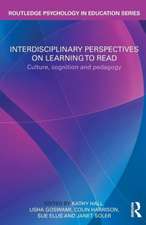Colonized Schooling Exposed: Progressive Voices for Transformative Educational and Social Change: Routledge Studies in Education, Neoliberalism, and Marxism
Autor Pierre Orelus, Curry Malott, Romina Pachecoen Limba Engleză Paperback – 18 noi 2016
| Toate formatele și edițiile | Preț | Express |
|---|---|---|
| Paperback (1) | 370.35 lei 6-8 săpt. | |
| Taylor & Francis – 18 noi 2016 | 370.35 lei 6-8 săpt. | |
| Hardback (1) | 1161.80 lei 6-8 săpt. | |
| Taylor & Francis – 13 ian 2014 | 1161.80 lei 6-8 săpt. |
Din seria Routledge Studies in Education, Neoliberalism, and Marxism
-
 Preț: 308.96 lei
Preț: 308.96 lei -
 Preț: 302.68 lei
Preț: 302.68 lei - 5%
 Preț: 332.06 lei
Preț: 332.06 lei -
 Preț: 385.36 lei
Preț: 385.36 lei -
 Preț: 366.14 lei
Preț: 366.14 lei - 18%
 Preț: 997.14 lei
Preț: 997.14 lei -
 Preț: 378.83 lei
Preț: 378.83 lei -
 Preț: 376.41 lei
Preț: 376.41 lei -
 Preț: 482.66 lei
Preț: 482.66 lei - 18%
 Preț: 1001.07 lei
Preț: 1001.07 lei - 16%
 Preț: 231.55 lei
Preț: 231.55 lei -
 Preț: 173.21 lei
Preț: 173.21 lei -
 Preț: 335.51 lei
Preț: 335.51 lei - 17%
 Preț: 250.36 lei
Preț: 250.36 lei -
 Preț: 419.76 lei
Preț: 419.76 lei -
 Preț: 400.17 lei
Preț: 400.17 lei -
 Preț: 368.77 lei
Preț: 368.77 lei -
 Preț: 356.18 lei
Preț: 356.18 lei -
 Preț: 389.01 lei
Preț: 389.01 lei -
 Preț: 420.14 lei
Preț: 420.14 lei - 17%
 Preț: 227.22 lei
Preț: 227.22 lei -
 Preț: 376.10 lei
Preț: 376.10 lei -
 Preț: 420.32 lei
Preț: 420.32 lei -
 Preț: 264.59 lei
Preț: 264.59 lei - 18%
 Preț: 1001.70 lei
Preț: 1001.70 lei - 31%
 Preț: 763.62 lei
Preț: 763.62 lei -
 Preț: 376.10 lei
Preț: 376.10 lei - 18%
 Preț: 1006.30 lei
Preț: 1006.30 lei - 18%
 Preț: 1000.27 lei
Preț: 1000.27 lei -
 Preț: 389.38 lei
Preț: 389.38 lei -
 Preț: 419.17 lei
Preț: 419.17 lei
Preț: 370.35 lei
Nou
Puncte Express: 556
Preț estimativ în valută:
70.86€ • 74.19$ • 58.64£
70.86€ • 74.19$ • 58.64£
Carte tipărită la comandă
Livrare economică 05-19 aprilie
Preluare comenzi: 021 569.72.76
Specificații
ISBN-13: 9781138286863
ISBN-10: 1138286869
Pagini: 220
Dimensiuni: 152 x 229 mm
Greutate: 0.32 kg
Ediția:1
Editura: Taylor & Francis
Colecția Routledge
Seria Routledge Studies in Education, Neoliberalism, and Marxism
Locul publicării:Oxford, United Kingdom
ISBN-10: 1138286869
Pagini: 220
Dimensiuni: 152 x 229 mm
Greutate: 0.32 kg
Ediția:1
Editura: Taylor & Francis
Colecția Routledge
Seria Routledge Studies in Education, Neoliberalism, and Marxism
Locul publicării:Oxford, United Kingdom
Public țintă
Postgraduate and UndergraduateCuprins
Introduction Part 1. Unmasking the Wretchedness of Neo-liberalism and Neo-colonialism 1. Colonialism in the 21ist Century: A Critical Analysis Pierre W. Orelus 2. Violence and the Interstices of Difference: Working With[in] and Around Fanon George J. Sefa Dei and Loren Ola Delaney 3. Colonialism and Neoliberalism: Twins of Inequities A Conversation with Vijay Prashad 4. Countering the Colonizing Allure of (Pseudo) Scientific Discourse in Education Myriam Torres 5. Courageous Voices against Neocolonial Schooling and White Supremacy A Conversation with Sandy Grande 6. Surviving Language as a Refugee Marisol Ruiz 7. Unfair Comparisons: Monolingual Norms and Language Discrimination against Non-native English Speaking Students at US Colleges and Universities John Katunich 8. An Arab-Muslim Feminist Negotiating Gender/Nation/Sexuality/Colonial Discourses A Conversation with Manal Hamzeh 9. Fighting Microaggression on University and College Campuses Marivel Oropeza Part 2. Unmasking the Wretchedness of Neo-liberalism and Neo-colonialism Introduction 10. Marxist Scholarship in Neoliberal Times: Social Imagination or Social Revolution? Antonia Darder 11. A Critical Pedagogy of Revolutionary Solidarity Against Neoliberal, White-Supremacist, Petro-Chemical Plunder A Conversation with Curry Stephenson Malott 12. Understanding History from the Standpoint of the Oppressed Pierre W. Orelus 13. Uncovering the Neoliberal and Neocolonial Western Agenda A Conversation with Sangeeta Kama 14. Education, Neoliberalism, Neoconservatism and Class Struggle in Britain and Europe David Hill Conclusion
Descriere
This book presents a novel perspective on neocolonialism, education and other related issues. It unveils the effects of neocolonialism on the learning and well-being of students and workers, including marginalized groups such as Native Americans, Latino/as, and African Americans. It is a collection of in-depth interviews with and heartfelt essays by committed social justice educators and scholars genuinely concerned with educational issues situated in the context of western neocolonialism and neoliberalism.






